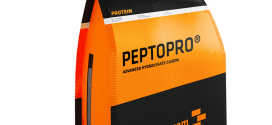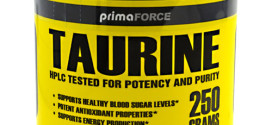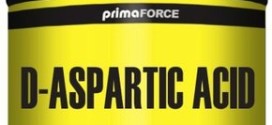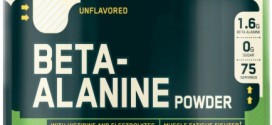Supplement Ingredient Guide: Protein
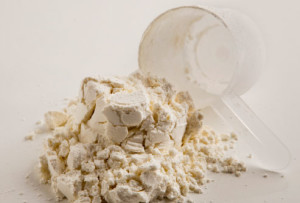
What is it?
Proteins are large biological molecules built of several chains of amino acids. They have a wide variety of uses within the body, however within the context of nutrition, proteins are used for the recovery and building of new muscle fibres. There are many sources for protein, the most common being: milk, meats and nuts. Furthermore, it must be noted that there are different types of protein.
Indications
Protein supplementation is advised for anyone whom partakes in regular exercise regardless of how rigorous it is. This should initially be achieved through food and then dietary supplements such as protein shakes. The best times for taken protein are outlined here.
How much should I take?
This is one of those questions which the answer depends on the individual and their aims and goals. For that reason I’ve devised a Protein intake calculator which should help you calculate how much you should be taking.
However, on average, for most individuals, 1 gram of protein per pound of body weight per day is a good target. Those who are looking to add size may need as much as 1.5 g protein/lb. body weight/day. You should also plan on eating some extra protein (1.25-1.5 g/lb/day) if you’re trying to lose weight on higher-protein, lower carbohydrate diets, as some of the amino acids will be burned for fuel.
These amounts include all of the protein consumed through foods, beverages, and supplements. What’s more, your daily protein allotment should be spread out over 4-6 smaller meals to enhance absorption and utilisation. If you’re a big meat, fish, poultry, egg, and dairy food eater, you can probably get by with a smaller “hit” of protein from your powdered mix.
Vegetarians and others who eat lots of starchy foods will benefit more from a higher-protein formula.
Research
There are two ways by which protein works. The high concentration of Branch Chain Amino Acids more commonly known as BCAA’s are just like the ones found within the muscle which makes them ideal for your body for when it’s in repair and recovery mode, it’s like you you’re giving your muscles the building blocks which it needs to grow. What’s less commonly known is that whey protein also has a high concentration of immunoglobulin which act as cell mediators effectively telling the body increase the body’s immunity levels, but also promoting muscle growth.
Protein is also responsible for the reduction in the levels of cortisol. Cortisol is a stress hormone, released during periods of physical stress. It is known to have a negative effect on muscle growth by increasing the rate of catabolism (muscle breakdown).
Side effects
Whey protein has no real side effects unless you are allergic to milk since whey protein is extracted from milk. However, whey protein MUST NOT REPLACE MEALS since that will be depriving the body from other crucial nutrients which is till needs for a healthy diet.
References
1. Krissansen GW. Emerging Health Properties of Whey Proteins and Their Clinical
Implications. Jorn Amer. College of Nutrition 2007; 26 (6): 713S-723S
2. Burke DG, Chilibeck PD, Davidson KS, Candow DG, Farthing J, Smith-Palmer T. The
effect of whey protein supplementation with and without creatine monohydrate
combined with resistance training on lean tissue mass and muscle strength. Int J Sport
Nutr Exerc Metab. 2001; 11(3): 349-64
3. Davis JL. Whey + Creatine = More Muscle Strength. WebMD 2003.
4. Buckley JD, Thomson RL, Coates AM, Howe RC, DeNichilo MO, Rowney MK.
Supplementation with a whey protein hydrolysate enhances recovery of muscle forcegenerating
capacity following eccentric exercise. Journal of Sci and Med in Sport
2008;06:007
5. Rusu D, Drouin R, Pouliot Y, Gauthier S, Poubelle PE. A Bovine Whey Protein Extract
Can Enhance Innate Immunity by Priming Normal Human Blood Neutrophils. J Nutr
2009; 139 (2) 386-93
6. Cribb, P. J., Williams, A. D., Hayes, A. and Carey, F. (2002) The effect of whey isolate and resistance training on strength, body composition, and plasma glutamine. Medicine and science in Sports and Exercise. 34, S1688.
7. Lands, L. C., Grey, V. L. and Smountas, A. A. (1999) Effect of supplementation with a cysteine donor on muscular performance. Journal of Applied Physiology. 87, 1381-1385.
8. Levenhagen, D. K., Carr, C., Carlson, M. G., Maron, D. J., Borel, M. J. and Flakoll, P. J. (2002) Postexercise protein intake enhances whole body and leg protein accretion in humans. Medicine and Science in Sports and Exercise. 34, 828-837.
9. Markus, C. R., Olivier, B., Panhuysen, G. E. M., Gugten, J. V. D., Alles, M. S., Tuiten, A., Westenberg, H. G. M., Fekkes, D., Koppeschaar, H. F. and De Haan, E. E. H. F. (2000) The bovine protein alpha-lactalbumin increases the plasma ratio of tryptophan to the other large neutral amino acids, and in vulnerable subjects raises brain serotonin activity, reduces cortisol concentration, and improves mood under stress. American Journal of Clinical Nutrition. 71, 1536-1544.
10. http://www.onacademy.co.uk/.
 Supplement Judge Unbiased Supplement Reviews – Do they really work??
Supplement Judge Unbiased Supplement Reviews – Do they really work??

